I.
“So,” Dr. Hirschfeld began, “what ails?”
Patient P had much to say; so much to say, in fact, that nothing came out for a long while. “I’m not sure where to start,” he said at last. “So much has happened since we parted ways. Since Lily left me.”
Because you failed to cure me. (He did not say that, of course, but he might as well have, and the doctor wrote it down as if he had.)
“And something has happened since to bring you back here,” Hirschfeld confirmed. “I take it you are still wearing women’s clothes for sexual gratification?”
“That’s not why I’m here,” P said, responding to the question without answering it in full.
The doctor waited motionlessly for his patient to present his problem.
P said, “I think… I may be going mad.”
Hirschfeld held his pencil at the ready and suggested, “Why don’t you start from the beginning?”
II.
“Did you believe this relic was cursed when you sent it to your mother?” Hirschfeld asked. P had been sharing his journal in session.
P shook his head. “No. It was only later, when people associated with the excavation started dying, that I began to wonder. I would not say that I believed in curses. At least,” he added quietly, “I didn’t then.”
“Hm,” the doctor grunted. After a while, he said, “I wonder what it would mean for you if part of you, some small part of you, wanted your parents to die.”
P scoffed at the brazen outrageousness of the analyst’s thinking and folded his arms. “What kind of question is that? Really, doctor! Are you trying to provoke me?”
“Perhaps I am,” the doctor acknowledged. “So humour me. What would it mean for you if you wanted your parents to die?”
P sighed in irritation. “For one, it would mean I am a horrible person! What kind of son would—”
“Read,” Hirschfeld interrupted, pointing to a paragraph in a journal entry his patient had crossed out entirely.
P took his journal and reluctantly read aloud, “I can still remember when I was a boy and buried my father's gold fob watch in the yard. Then I dug it up, and proudly returned it to him, pretending that it was a great treasure. (Seems I am still preoccupied with digging in the dirt!) My, how red in the face he turned! And then he tossed me down the stairs like a sack of potatoes. I dislocated my shoulder, but dared not complain because then he would really get angry. Thank you, Father, for teaching me the value of a stiff upper lip!”
P stopped, his eyes downcast.
“Keep going,” the doctor prompted.
Struggling, the patient continued, “And you, Mum: thank you for not sheltering me from such harsh lessons. Thank you also for letting me be the strong one after Davey died in that slimy hole at Passchendaele. Even as I tended to you, overwhelmed by grief as you were, you asked me, ‘Why did it have to be him, Petey? Why not you?’ Did that ever open my eyes! Yet, I could not but share your wish. How glad it makes me to know that you are both reunited at last!”
The ink began to blur where P’s tears fell onto the page.
“Those sound to me like the words of an angry person,” Hirschfeld said gently, “A person who is hurting, but not a horrible person.”
P’s hands covered his face as his body shook with sobs he could barely contain.
III.
“I would like to point out something,” the doctor said. “This woman, Irene; she features prominently in your journal, but you have never mentioned her in our sessions.”
“Huh,” P grunted. It was true.
Hirschfeld continued, “I mention it only because she seems to have been a central figure in these experiences that troubled you so. I wonder what it means that you have thus far omitted her from our exploration of these events.”
“Perhaps it does not mean anything,” the patient countered.
“Perhaps,” the doctor acknowledged, and then riposted: “But in my experience, that which is not spoken is often more telling than that which is.”
P sighed, “Fine. As you know, we first met on Carter’s dig in Egypt. It was coincidence that brought us together again at Mohenjo-Daro. We were simply colleagues at first, but then circumstances led us to become something like partners against a common threat.”
“Partners?” Hirschfeld inquired, finding it an interestingly detached term to describe what seemed to be a much more personal relationship.
“Friends,” P amended.
“You seem reluctant to acknowledge her importance to you,” the doctor observed.
“I worry for her,” P confessed. “She's far away now, and I’m scared that I might not be able to keep her safe.”
“Does she remind you of anyone else in your life?” Hirschfeld asked.
“She reminds me somewhat of my sister,” P said after some reflection. From his position on the couch, he could not see the doctor raise an eyebrow. “But the better parts of her: the indomitable, adventurous parts; not the exploitative, manipulative parts.”
“You and your sister… had an unconventional relationship,” the doctor recalled.
“Irene and I were nothing like that,” snapped P.
“Did you ever think about—”
“Of course!” P said, reddening a shade. “What man wouldn’t? But I could never approach her on such terms. No, no. She certainly won’t understand, and God knows I never want to have to go through an experience like that again! I put both Lily and myself through hell, and once was quite enough.”
“So you channeled your sexual urges into something more acceptable, noble even, something safer. You became her protector.”
P snorted. “Some protector,” he remarked drily. “And why does everything with you analysts have to be about sex, anyway?”
Hirschfeld retorted, just as drily: “You do realize where you are?”
The doctor’s point, and the humour he used to make it, only galled his patient more. “How many times do I have to say it, Dr. Hirschfeld? I’m not here to talk about that.”
“Right, of course,” the doctor said. “Tell me then, what would the loss of Irene mean to you?”
P sighed, wondering if he had not already lost her. “Well,” he began, “not only would I feel responsible if something were to happen to her, God forbid, but it would mean that I had lost the only other person who shared in these dreadful events, and who accepts what I went through as the honest truth, as terrible as the implications of such a truth are. She too had some experiences there that she did not fully understand and which seemed implausible at the time but yet begged for an explanation. We are linked by tragic circumstances. Frankly, I do not know that I would be able to go on without her.”
Nodding as he listened, Hirchfeld jotted the following in his notepad: Folie à deux.
IV.
“What more can you remember about your experience at the well?” Hirschfeld asked.
“I’ve told you all I can remember,” Patient P insisted. “In truth, I am thankful I cannot recall more.”
The doctor scribbled something in his notepad before declaring, “I think we should try hypnosis.”
“Hypnosis? To help me remember?”
The doctor nodded.
“Why should I want to remember the most horrific experience of my life more clearly?” P balked. “So I can lose even more sleep? What, have our sessions become so boring and repetitive that you need more details to titillate you?”
Hirschfeld did not respond to P’s sudden display of hostility, though it told him that he was pursuing a valuable line of inquiry. “I would not say they are boring,” he clarified, “though I do believe we have reached something of an impasse. You have been very open in sharing with me what you can, but I feel as though I were reading a book in which several pages are left blank.”
“And how would it help me to fill in these pages?” P asked skeptically.
“You are familiar with my mind-as-iceberg analogy,” the doctor said, “so let me make another. This time, I will compare the mind to a closet, in which the psychic energy of negative emotional experiences is packaged into boxes and tucked away from view, kept out of awareness. But just because something is not seen does not mean it is not there. And, just like a closet, the mind can only contain so much; at some point, when it is too full, opening that closet even a little will cause all those boxes to tumble forward and spill out their contents.”
“I see,” P said. “And you think I should unpack these boxes to prevent such a thing from happening.”
The doctor nodded.
“I am not eager to revisit that experience,” P acknowledged, reluctantly adding, “but if you say it will help me, then I see no other choice. I am desperate for relief.”
“Very good,” Hirschfeld said. He rose from his seat to draw the window shades closed and to retrieve a candle from the bookshelf. Lighting it with a match, he placed it on the table in front of the couch upon which P reclined before returning to his own chair. “Now then. Relax. Focus your eyes on the candle. Watch the flame closely, and listen carefully to my voice…”
*****
“Find yourself back in India,” Hirschfeld suggested, “back at the hospital, on that night at the well. Where are you? What do you see?”
“I‘m in the grass,” P said. “It’s dark… Ashan is beside me. I can see the well… There are jackals… many… sitting around it.. watching.”
“What else?” The doctor pressed, having heard this part before.
“There is a light in the well.”
“What kind of light?”
“I.. don’t know… never seen anything like it before.”
“Is it like a firelight? A torch, or lantern?”
“No,” P said. “It’s like a glow… silver.. cold.”
The doctor’s pencil scribbled as the patient talked. “What happens next?”
“The jackals… in a circle. The glow is getting brighter… like nothing I’ve ever seen.” In his trance, P shuddered. “Something is happening… it feels wrong.”
“What gives you that feeling?”
“Don’t know… I’m afraid of what might happen… I mustn’t let it happen. I have to stop it!”
“What is it you do?”
“I pick up a rock and throw.. I see a stick on the ground, grab it… I charge forward. I have to stop it! But it’s no good, they are too quick. I hear a voice…”
“Whose voice?”
“I don’t know… in the well…”
“What is it saying?”
“Rakram… I call out to Ashan to bring stones… Agh!! One of them has me by the wrist!” P’s arm spasmed as his mind recalled the pain of the jackal’s bite and his desperation to shake it loose.
“You’re safe,” Hirschfeld suggested soothingly. “You can feel no pain in this state.” Seeing his patient relax, the doctor asked, “What is happening now?”
“The light is fading… I have to look inside, I have to know… oh, God.. it’s a man’s face! I’ve seen him before… it’s John Daniel! God, those horrible, bulging eyes… please, let me wake up!”
The doctor kept writing and said, “You are fine, the face is gone. Where are you now?”
“I.. I don’t know… a library, I think, but not a library…”
“Tell me everything you see.”
“I’m sitting on a cube… it’s cold, stone… there is a larger block of stone… many scrolls… by God, it’s huge… the shelves could fit a man… so tall, I can’t see the top… there are spires, orbs…” P began to shiver. “It’s cold… hard to breathe…”
“What are you doing?”
“I find a book under the scrolls… some glyph on the cover, strange.. yet familiar… I open it.. the pages are made of some mineral, the symbols… never seen them before, but I can read them… they… syllables… my mind… no words… something.. is happening in my brain.. oh, God, it has me..!”
Hirschfeld leaned forward. “You did not have the words then, but you have them now. Remember and tell me what you see.”
“It’s too much..! Vast… aeons..! Oh, God, I can’t… I can’t.. urk!” Alarmingly, P’s body tensed and writhed, as if in a seizure, and no more words would come.
“Tell me!” The doctor urged, “Speak!”
As if mechanically cranked, P’s jaw opened wide as he struggled to comply. At first, all that came out was a long, hollow croak. This wretched noise grew in volume until, in a shrill, ear-splitting voice that seemed less than human, P emitted the most detestable glossolalia Hirschfeld had ever heard in all his years of working with psychotics: “IA! IA! TH’G-NGH’AAA! MW’G-WGAA! YIG-SHIG’GAAA! T’SOTH-SHOG’GAA! E’YAYAYAYAAAAAAAAAAAAAAAH!”
Suddenly, P sat boldly upright, the terror of reliving his trauma having snapped him out of his trance. Panting, drenched in sweat, he was clearly shaken; but just as one who wakes from a nightmare is gladdened to suddenly find himself in the safety of his bed, P breathed deeply in relief as he recognized the familiar setting of his analyst’s office.
“Well?” He asked, looking to the doctor expectantly, hoping he had provided sufficient detail that there would be no encore to the exercise.
“I think that will be all for today,” Hirschfeld said with practised calm. P did not notice the bead of sweat that trickled down the doctor’s brow, nor the broken pencil point on the floor.
V.
Hirchfeld remarked, “You’ve been very forthcoming in sharing your journal with me and processing your feelings. You have also been courageous in allowing exploration of memories you wanted to forget. But, I must ask, is there anything you would like to tell me? Anything we have not talked about but which you think might be important for me to know?”
I killed a man! The patient’s conscience screamed. I came upon him while he was sleeping, put my gun in his mouth, gagged him and forced him to bind himself, robbed him, killed him in cold blood, and felt nothing!
“No,” P lied, “nothing.”
Subscribe to:
Post Comments (Atom)
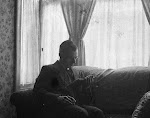
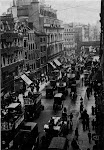
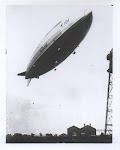
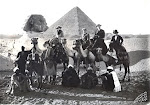

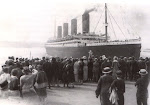
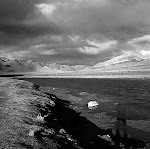

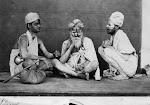

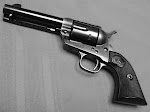
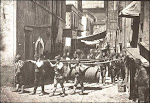


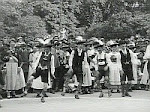
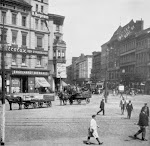
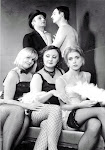
No comments:
Post a Comment